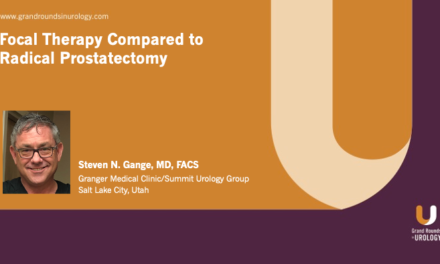M. Scott Lucia, MD, presented “Pathologist’s Perspective on Focal Therapy” during the Southwest Prostate Cancer Symposium 2020 virtual conference in December 2020.
How to cite: Lucia, M. Scott. “Pathologist’s Perspective on Focal Therapy” December 2020. Accessed Dec 2025. https://grandroundsinurology.com/pathologists-perspective-on-focal-therapy-2020/
Pathologist’s Perspective on Focal Therapy – Summary
M. Scott Lucia, MD, Professor and Vice-Chair of the Department of Pathology and Director of Anatomic Pathology of the Prostate Diagnostic Laboratory at the University of Colorado Anschutz Medical Campus (CAMC) School of Medicine, reviews study data to help physicians decide which biopsy route is best when selecting patients for focal therapy. Citing data from the SEER study, Dr. Lucia argues that TRUS biopsies are insufficient because they struggle to reveal small high-grade tumors, often leading to upgrading post-biopsy. He suggests that the deficiencies of TRUS biopsy demonstrate a need to increase precise sampling with transperineal template-guided mapping biopsies (TTMB) and multiparametric (mp)MRI targeted biopsies. Dr. Lucia then looks at studies that support the use of TTMB, including the PROMIS trial, which found that TTMB outperformed TRUS biopsy for detection of cancer by an average of 33%. He also justifies the use of mpMRI with data from the PRECISION trial, which found that clinically significant prostate cancer was found in 38% of MRI patients versus 26% of standard biopsy patients. Additionally, a European study testing MRI and TRUS biopsy against prostatectomy found that TRUS biopsy alone had a 43% rate of upgrading while MRI used in combination with TRUS biopsy had a 23% rate. Another study found that mpMRI used with TTMB and targeted biopsy missed less clinically significant cancer than mpMRI and TRUS did independently. Dr. Lucia concludes that the case for using mpMRI in combination with TTMB as opposed to TRUS alone is clear based on the data.
About the Southwest Prostate Cancer Symposium 2020 virtual conference:
Presented by Program Chairs Nelson N. Stone, MD, and Richard G. Stock, MD, this virtual conference educated attendees about advances in the management of localized and advanced prostate cancer, with a focus on imaging, technology, and training in the related devices. It included a scientific session, as well as live demonstrations of surgical techniques. You can learn more about the conference, including the 2021 iteration, here.
ABOUT THE AUTHOR
M. Scott Lucia, MD, is a Professor and Vice Chair of the Department of Pathology, the Chief of Genitourinary and Renal Pathology, and the Director of Research Histology at the University of Colorado Anschutz Medical Campus School of Medicine in Aurora, Colorado. He also serves as the Director of the Pathology Shared Resource at the University of Colorado Cancer Center.





